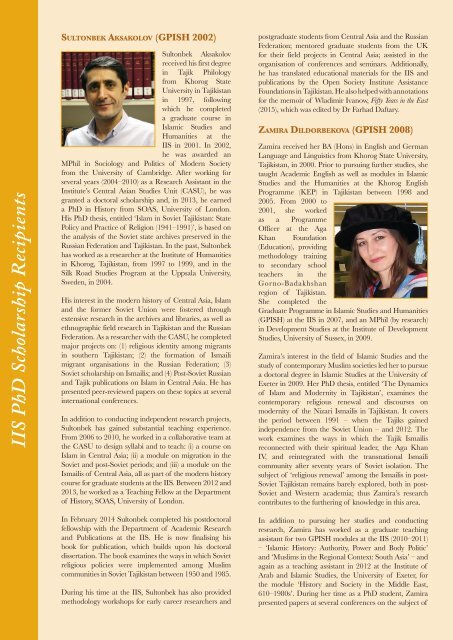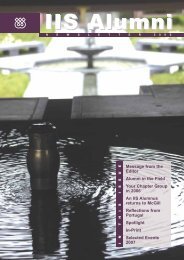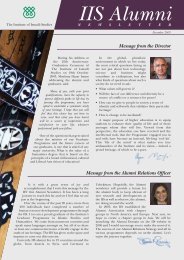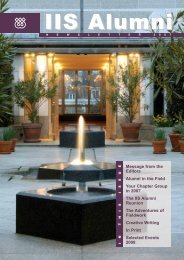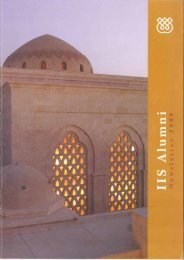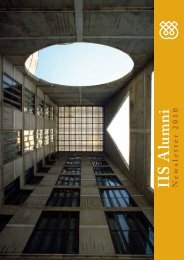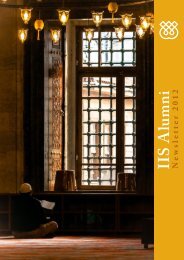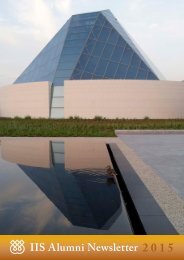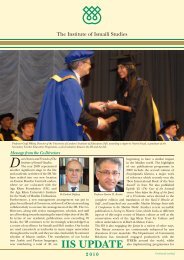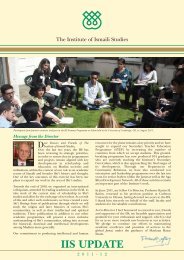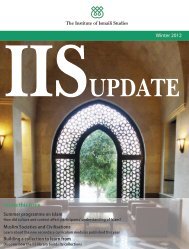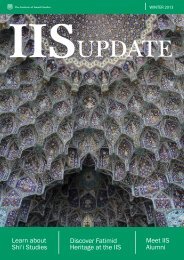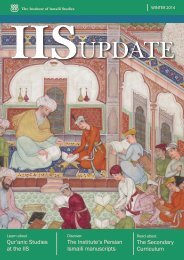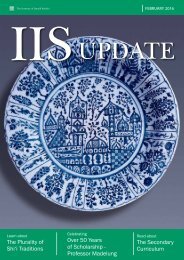IIS Alumni Newsletter 2014
You also want an ePaper? Increase the reach of your titles
YUMPU automatically turns print PDFs into web optimized ePapers that Google loves.
<strong>IIS</strong> PhD Scholarship Recipients<br />
Sultonbek Aksakolov (GPISH 2002)<br />
Sultonbek Aksakolov<br />
received his first degree<br />
in Tajik Philology<br />
from Khorog State<br />
University in Tajikistan<br />
in 1997, following<br />
which he completed<br />
a graduate course in<br />
Islamic Studies and<br />
Humanities at the<br />
<strong>IIS</strong> in 2001. In 2002,<br />
he was awarded an<br />
MPhil in Sociology and Politics of Modern Society<br />
from the University of Cambridge. After working for<br />
several years (2004–2010) as a Research Assistant in the<br />
Institute’s Central Asian Studies Unit (CASU), he was<br />
granted a doctoral scholarship and, in 2013, he earned<br />
a PhD in History from SOAS, University of London.<br />
His PhD thesis, entitled ‘Islam in Soviet Tajikistan: State<br />
Policy and Practice of Religion (1941–1991)’, is based on<br />
the analysis of the Soviet state archives preserved in the<br />
Russian Federation and Tajikistan. In the past, Sultonbek<br />
has worked as a researcher at the Institute of Humanities<br />
in Khorog, Tajikistan, from 1997 to 1999, and in the<br />
Silk Road Studies Program at the Uppsala University,<br />
Sweden, in 2004.<br />
His interest in the modern history of Central Asia, Islam<br />
and the former Soviet Union were fostered through<br />
extensive research in the archives and libraries, as well as<br />
ethnographic field research in Tajikistan and the Russian<br />
Federation. As a researcher with the CASU, he completed<br />
major projects on: (1) religious identity among migrants<br />
in southern Tajikistan; (2) the formation of Ismaili<br />
migrant organisations in the Russian Federation; (3)<br />
Soviet scholarship on Ismailis; and (4) Post-Soviet Russian<br />
and Tajik publications on Islam in Central Asia. He has<br />
presented peer-reviewed papers on these topics at several<br />
international conferences.<br />
In addition to conducting independent research projects,<br />
Sultonbek has gained substantial teaching experience.<br />
From 2006 to 2010, he worked in a collaborative team at<br />
the CASU to design syllabi and to teach: (i) a course on<br />
Islam in Central Asia; (ii) a module on migration in the<br />
Soviet and post-Soviet periods; and (iii) a module on the<br />
Ismailis of Central Asia, all as part of the modern history<br />
course for graduate students at the <strong>IIS</strong>. Between 2012 and<br />
2013, he worked as a Teaching Fellow at the Department<br />
of History, SOAS, University of London.<br />
In February <strong>2014</strong> Sultonbek completed his postdoctoral<br />
fellowship with the Department of Academic Research<br />
and Publications at the <strong>IIS</strong>. He is now finalising his<br />
book for publication, which builds upon his doctoral<br />
dissertation. The book examines the ways in which Soviet<br />
religious policies were implemented among Muslim<br />
communities in Soviet Tajikistan between 1950 and 1985.<br />
During his time at the <strong>IIS</strong>, Sultonbek has also provided<br />
methodology workshops for early career researchers and<br />
postgraduate students from Central Asia and the Russian<br />
Federation; mentored graduate students from the UK<br />
for their field projects in Central Asia; assisted in the<br />
organisation of conferences and seminars. Additionally,<br />
he has translated educational materials for the <strong>IIS</strong> and<br />
publications by the Open Society Institute Assistance<br />
Foundations in Tajikistan. He also helped with annotations<br />
for the memoir of Wladimir Ivanow, Fifty Years in the East<br />
(2015), which was edited by Dr Farhad Daftary.<br />
Zamira Dildorbekova (GPISH 2008)<br />
Zamira received her BA (Hons) in English and German<br />
Language and Linguistics from Khorog State University,<br />
Tajikistan, in 2000. Prior to pursuing further studies, she<br />
taught Academic English as well as modules in Islamic<br />
Studies and the Humanities at the Khorog English<br />
Programme (KEP) in Tajikistan between 1998 and<br />
2005. From 2000 to<br />
2001, she worked<br />
as a Programme<br />
Officer at the Aga<br />
Khan Foundation<br />
(Education), providing<br />
methodology training<br />
to secondary school<br />
teachers in the<br />
Gorno-Badakhshan<br />
region of Tajikistan.<br />
She completed the<br />
Graduate Programme in Islamic Studies and Humanities<br />
(GPISH) at the <strong>IIS</strong> in 2007, and an MPhil (by research)<br />
in Development Studies at the Institute of Development<br />
Studies, University of Sussex, in 2009.<br />
Zamira’s interest in the field of Islamic Studies and the<br />
study of contemporary Muslim societies led her to pursue<br />
a doctoral degree in Islamic Studies at the University of<br />
Exeter in 2009. Her PhD thesis, entitled ‘The Dynamics<br />
of Islam and Modernity in Tajikistan’, examines the<br />
contemporary religious renewal and discourses on<br />
modernity of the Nizari Ismailis in Tajikistan. It covers<br />
the period between 1991 – when the Tajiks gained<br />
independence from the Soviet Union – and 2012. The<br />
work examines the ways in which the Tajik Ismailis<br />
reconnected with their spiritual leader, the Aga Khan<br />
IV, and reintegrated with the transnational Ismaili<br />
community after seventy years of Soviet isolation. The<br />
subject of ‘religious renewal’ among the Ismailis in post-<br />
Soviet Tajikistan remains barely explored, both in post-<br />
Soviet and Western academia; thus Zamira’s research<br />
contributes to the furthering of knowledge in this area.<br />
In addition to pursuing her studies and conducting<br />
research, Zamira has worked as a graduate teaching<br />
assistant for two GPISH modules at the <strong>IIS</strong> (2010–2011)<br />
– ‘Islamic History: Authority, Power and Body Politic’<br />
and ‘Muslims in the Regional Context: South Asia’ – and<br />
again as a teaching assistant in 2012 at the Institute of<br />
Arab and Islamic Studies, the University of Exeter, for<br />
the module ‘History and Society in the Middle East,<br />
610–1980s’. During her time as a PhD student, Zamira<br />
presented papers at several conferences on the subject of


